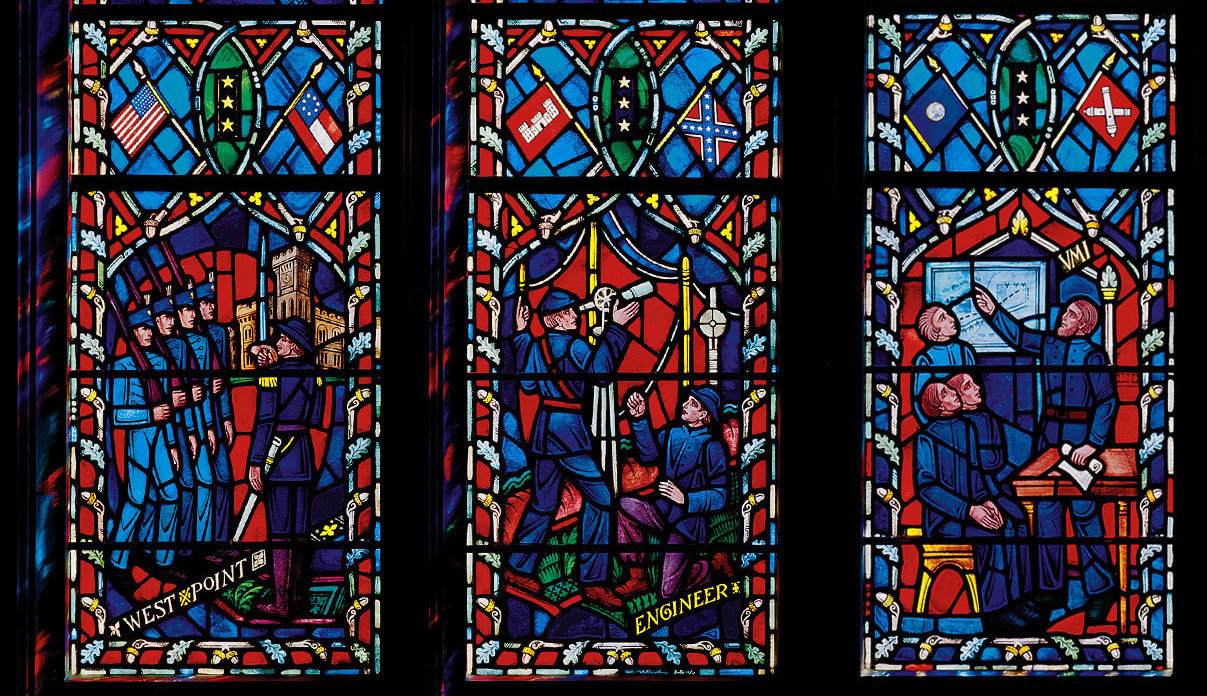
I wrote a lot last summer about the controversies swirling around the place of the Confederate flag in contemporary American society. As I said then, my feelings on the issue are more than a little mixed.
To recap: I agree that the Confederate battle flag has no place flying over any offices of government or place of public authority, as it used to fly over the state capitol grounds in South Carolina; I am less troubled by the local statues and monuments to those who served in the Civil War that dot the landscape of the American South; and I am untroubled by the flag’s presence at historic battlefields and in cemeteries marking the final resting places of those who fell in that terrible struggle, even as today we acknowledge that they died in defense of an indefensible institution.
With that background, let me note two recent developments.
A little more than a week ago, the Washington National Cathedral announced that it would remove from two stained glass windows depictions of the Confederate flag, replacing them with plain glass. One set of windows (shown at the top of this post) memorializes Gen. Robert E. Lee, the other Gen. Thomas ‘Stonewall’ Jackson. Washington National is a cathedral of The Episcopal Church (to which I belong). Lee was a lifelong Episcopalian while Jackson was baptized into the church but later became a Presbyterian.
While the church was divided during the Civil War, it’s split was never formally recognized, and once the war ended the Southern dioceses were swiftly welcomed back into the national church and little more was said about the past unpleasantness. The modern church has worked quite hard to overcome its own history of racism and advocate for a broad anti-racism social and policy agenda.
As controversies go in the Episcopal Church, this is pretty modest stuff. As the cathedral explained in a press release, the flags will be removed from the windows, which will otherwise remain in place to serve as a catalyst and focal point for a larger discussion of race and the legacy of slavery.
The other recent development in church-flag relations is far more interesting and significant. As The Atlantic reported:
The Southern Baptist Convention, the largest Protestant Christian denomination in the U.S. with 15.8 million members, on Tuesday adopted a resolution that said the flag was an emblem of slavery, and called members to discontinue its display “as a sign of solidarity of the whole Body of Christ, including our African-American brothers and sisters.”
It’s hard to overstate just what a big deal this is. The Southern Baptist Convention owes its existence to a rift in the 1840s between northern and southern Baptists over whether slave owners could serve as missionaries. After the Civil War, the institution that would become the SBC split again when freed blacks left to establish their own association of churches out from under the thumb of white “supervision.”
Into the 1960s and through the Civil Rights era Southern Baptist pastors and congregations were for the most part reliable defenders of racial segregation and vehement opponents of integration. The denomination only elected its first African American president four years ago.
Russell Moore, president of the Ethics and Religious Liberty Commission, the denomination’s moral and public policy agency, explained the SBC’s reasoning in a compelling and powerful blog post:
It’s not often that I find myself wiping away tears in a denominational meeting, but I just did. The Southern Baptist Convention voted overwhelmingly to repudiate the display of the Confederate Battle Flag. This conservative evangelical denomination gathered together just miles from Ferguson, Missouri, to stand together against one lingering divisive symbol. …
As I’ve said before, the Cross and the Confederate flag cannot co-exist without one setting the other on fire. Today, messengers to the Southern Baptist Convention, including many white Anglo southerners, decided the cross was more important than the flag. They decided our African-American brothers and sisters are more important than family heritage. We decided that we are defined not by a Lost Cause but by amazing grace. Let’s pray for wisdom, work for justice, love our neighbors.
And let’s take down that flag.
Good for the SBC, and good for all of us trying to find our way out of the legacy of America’s long and bitter racial past and into a better, more just, and more inclusive future.